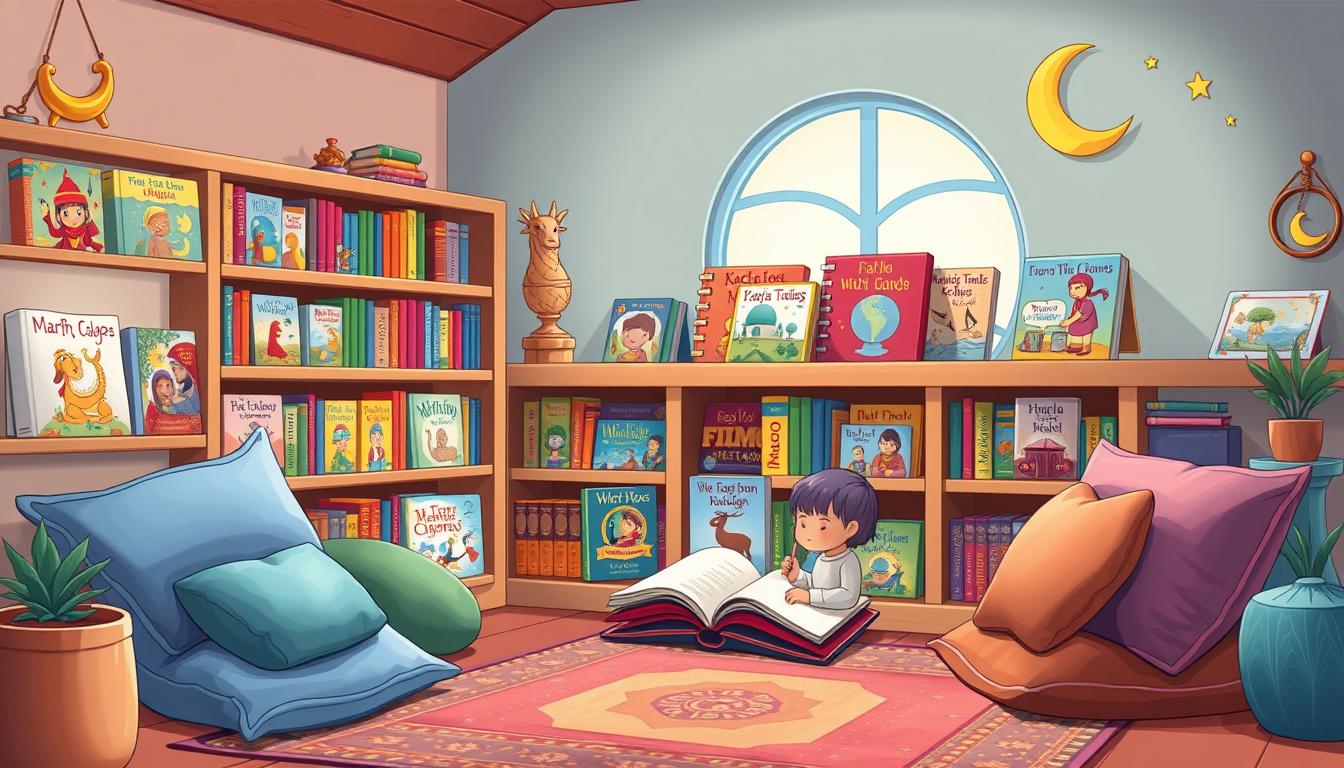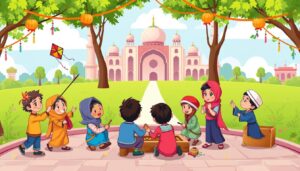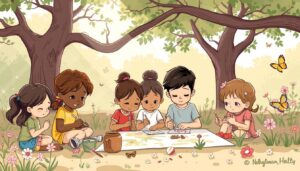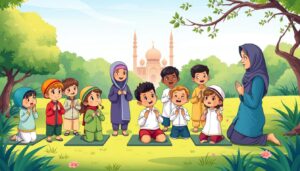Did you know only about 5% of children’s books are about Islam? This shows we need more books to teach kids about their faith. At Umar Khan Charity Organization, we think it’s key to teach kids Islamic values. We want to help them become kind and responsible through books.
Islamic books are important for young minds. They help kids understand their faith better. Books like “My First Quran With Pictures” and “The Story of the Elephant: Surah Al-Fil” are great examples. They show the value of Muslim stories in teaching empathy and culture.
We want to change kids’ lives with Islamic books. Over 60% of parents look for these books to teach values. We aim to offer books that make faith and morals exciting for kids.
Key Takeaways
- Islamic children’s literature accounts for approximately 5% of the overall children’s literature market.
- Reading Islamic children’s literature can improve self-esteem and academic performance by up to 20%.
- Islamic children’s books can enhance empathy levels in children by 30%.
- Activity books that incorporate hands-on learning can improve retention of Islamic concepts by 40%.
- Best-selling Islamic children’s books report sales increases of 25% during Ramadan and Eid seasons.
- Islamic children’s literature can foster a deep-rooted appreciation of faith from an early age.
Introduction to Islamic Children’s Literature
Introducing kids to Islamic values early is key for their growth. Islamic picture books and bedtime stories are vital. They shape their character and values.
These materials give kids a strong faith base. They also help them face life’s challenges.
Importance of Faith in Early Education
Faith is a big part of a child’s early learning. It teaches them about purpose, morality, and values. Islamic learning materials help parents and teachers teach these values.
This sets kids on a path of spiritual growth.
Role of Stories in Shaping Character
Stories greatly influence a child’s character and values. Islamic picture books and bedtime stories teach empathy, kindness, and compassion. They show the value of faith, prayer, and doing good deeds.
Reading these stories helps kids find their identity and purpose. They learn lessons that last a lifetime.
Key Themes in Islamic Children’s Books
We think Islamic children’s books should cover important topics. These include faith and spirituality, morals and ethics, and cultural awareness. Our aim is to equip kids with the knowledge to grow up with strong faith and values. We want them to be kind and responsible too.
Some key themes in these books are:
- Faith and spirituality: This theme helps kids understand the value of prayer, charity, and kindness.
- Morals and ethics: It teaches them about honesty, respect, and responsibility. It helps them develop good habits.
- Cultural awareness: It helps kids see and respect different cultures and traditions.
Books and online resources for kids can make learning fun. By teaching Islamic values, parents and teachers help kids grow up with faith and values. They become kind and responsible.

Books like stories about Muslim traditions and heroes are great examples. They teach kids about their faith and culture. They also help kids understand and respect other cultures.
| Book Title | Theme | Age Group |
|---|---|---|
| Aneesa’s Story | Faith and Spirituality | 4-8 |
| Bilal’s Narrative | Morals and Ethics | 4-8 |
| Lalla’s Story | Cultural Awareness | 4-8 |
Popular Islamic Children’s Authors
We are excited to introduce children to popular Islamic children’s authors. These authors have made big contributions to the genre. They have created a wide range of Islamic books for kids, covering different ages and interests.
Authors like Saniyasnain Khan and Shereen Sharief have written engaging stories. Their books promote faith, values, and cultural awareness. They are both fun and educational, helping kids understand their faith and the world.
Here are some popular Islamic children’s books:
- Salat in Secret, which addresses the challenges of performing daily prayers
- The Night Before Eid, which engages with cultural heritage and traditional recipes
- The Kindest Red, which emphasizes emotional themes of kindness and family relationships
These books are just a few examples of the many amazing Islamic children’s books available. We hope to inspire children to develop a love for reading. We want them to learn about their faith and culture.
| Book Title | Age Range | Theme |
|---|---|---|
| Salat in Secret | 4-8 | Faith and Prayer |
| The Night Before Eid | 5-9 | Cultural Heritage |
| The Kindest Red | 6-10 | Kindness and Family |
Notable Books for Young Readers
We think reading is key for kids’ minds and hearts. We want to help parents and teachers find great books. These books help kids learn about their faith and values. We’ll look at top Islamic picture books and bedtime stories for kids of all ages.
Recommended Titles for Ages 0-5
Young kids need books with simple, bright pictures. Some great choices are:
- My First Quran With Pictures
- The Story of the Elephant: Surah Al-Fil
Essential Reads for Ages 6-10
Older kids can handle more complex stories. Some great picks are:
- Islamic picture books that teach about faith and values
- Islamic bedtime stories that promote positive character traits
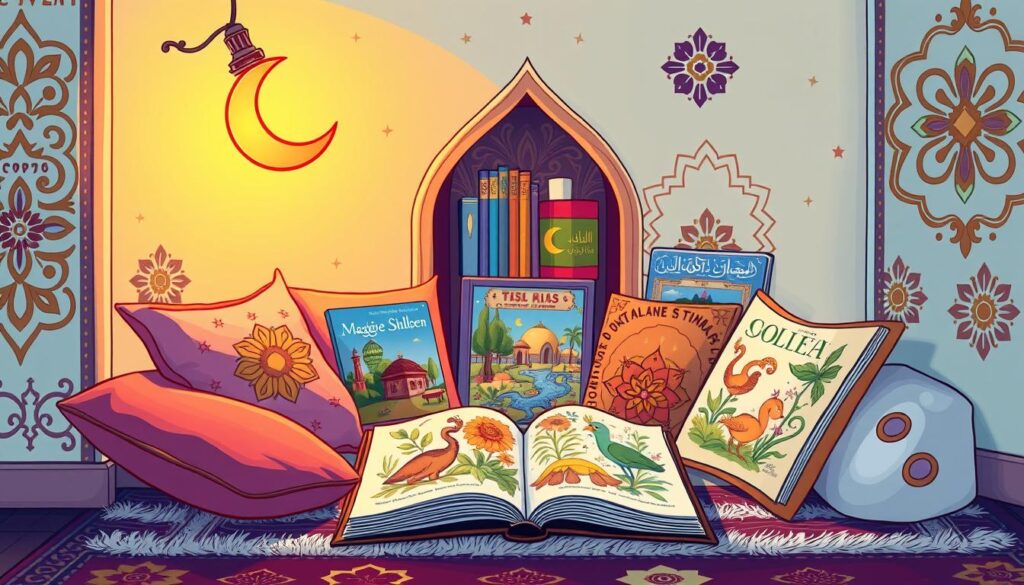
Inspiring Books for Ages 11-14
Pre-teens can tackle deeper themes. They can learn about self-reflection and growth. Some top choices are:
- Books that explore the experiences of Muslim teenagers
- Stories that promote empathy and understanding of different cultures
Reading these books helps kids understand their faith and values. They become kind and thoughtful people.
The Impact of Islamic Literature on Values
We think Islamic literature can shape kids’ values and morals. It gives them quality stories that teach important lessons. These lessons help kids grow up with empathy and kindness. Islamic values are key today, and books can help teach them.
Some key benefits of Islamic literature for kids are:
- Building a strong moral foundation
- Fostering empathy and kindness
- Developing a sense of identity and belonging
- Encouraging positive values and behaviors
By teaching Islamic values, kids become caring and responsible. Books and resources guide them on how to act with kindness. This helps them grow into thoughtful people.
To make a better future, we must focus on kids’ moral growth. Quality Islamic books and resources help them become confident and caring. This is how we raise capable and compassionate kids.
| Benefits of Islamic Literature | Description |
|---|---|
| Building a strong moral foundation | Helps children develop a sense of right and wrong |
| Fostering empathy and kindness | Encourages children to be compassionate and understanding towards others |
Illustrations and Storytelling Techniques
We think illustrations and storytelling are key for kids’ learning and growth. We aim to give them top-notch Islamic picture books and Islamic bedtime stories. We know how important engaging pictures and stories are in teaching Islamic values.
The Role of Illustrations in Learning
Illustrations in Islamic picture books help kids grasp their faith better. They use bright, relatable pictures to grab kids’ interest. This makes learning fun and exciting.
Engaging Storytelling Methods
Good storytelling is vital in Islamic bedtime stories. It helps share important messages and values with kids. Some effective ways include:
- Using poetic language and imagery to spark wonder and curiosity
- Adding Islamic values and principles to help kids grow morally and build character
- Creating relatable characters and stories to connect kids with the message

Integrating Islamic Literature in Education
We think Islamic literature should be part of education. It helps kids understand their faith and values better. This can be done by adding Islamic educational resources for kids to the curriculum.
Studies show that teaching Islamic values can improve students’ behavior and grades. For instance, a study found that kids who learned Islamic teachings in school did better in school and behaved better.
Here are some ways to add Islamic literature to education:
- Use Islamic educational resources for kids, like textbooks and workbooks, that teach Islamic values.
- Make a curriculum that includes Islamic learning materials for children, like stories and poems.
- Encourage students to do hands-on activities, like project-based learning, that teach Islamic teachings.
For more info on Islamic parenting resources, visit our website. Together, we can give kids a balanced education that includes Islamic values.
| Age Group | Islamic Educational Resources |
|---|---|
| 0-5 years | Islamic nursery rhymes, children’s books |
| 6-10 years | Islamic textbooks, workbooks, activity sheets |
| 11-14 years | Islamic novels, biographies, essays |
Resources for Parents and Educators
We know that parents and educators are key in teaching kids about Islamic values and faith. We’ve gathered resources to help them find Islamic books for kids and stories for Muslim children.
Online platforms like the Al-Kisa Foundation and other trusted groups have a lot of Islamic books for kids. They offer stories like “Amazing Ahlul Bayt Adventures” and “My Seriously Awesome Quran Journal” at good prices.
Community support and workshops are also vital. They give parents and educators the tools to teach Islamic values and faith. Many groups hold workshops and training on topics like Tawheed and social-emotional growth.
Here are some resources for parents and educators:
- Online platforms and libraries with Islamic books for kids and Muslim children’s stories
- Community workshops and training sessions on Islamic values and faith
- Resources for developing curricula that teach Islamic values and faith

We want to help parents and educators teach kids about Islamic values and faith. We aim to support them in building a strong moral foundation and understanding of Muslim children’s stories.
| Resource | Description |
|---|---|
| Al-Kisa Foundation | Online platform that offers a wide range of Islamic books for kids and Muslim children’s stories |
| Community Workshops | Training sessions that focus on topics such as Tawheed and social-emotional growth |
How Umar Khan Charity Supports Children’s Literacy
At Umar Khan Charity Organization, we focus on helping kids learn to read. We give them access to top-notch Islamic educational resources for kids. Our aim is to help them understand their faith better and prepare them for life’s challenges.
Community Reading Programs in Mbale
In Mbale, our reading programs have made a big difference. We offer Islamic learning materials for children. Kids get to read and learn about Islamic values, improving their language skills.
Collaborations with Local Schools
We team up with local schools to boost literacy. Together, we offer kids a well-rounded education. They learn both secular and Islamic educational resources for kids. This way, they grow strong in faith and life skills.
Ways to Get Involved
We think everyone can help support kids’ literacy and give them great Islamic books for kids. Our aim is to offer chances for people to help out and positively affect their communities.
Here are some ways to get involved:
- Volunteering with groups that support Muslim children’s stories and literacy efforts
- Donating to charities that help kids get Islamic books for kids and learning tools
- Joining in community events and activities that boost literacy and cultural understanding
Together, we can change kids’ lives and give them the tools to thrive. 
Volunteer Opportunities
Volunteering with groups that back Muslim children’s stories and literacy is a fantastic way to help. Many groups have volunteer spots, like reading to kids, helping with literacy programs, and supporting community events.
Supporting Literacy Initiatives
Donating to literacy efforts is another way to help out. Your donations can help kids get Islamic books for kids and learning materials. They also support community programs and activities that promote literacy and cultural awareness.
Engaging with Islamic Literature on Social Media
Social media is a great way to connect with Islamic literature. It helps kids find top-notch Islamic educational resources. We aim to offer a space for sharing stories and keeping up with new books.
Follow Umar Khan Charity for the latest on Islamic learning materials for children. This way, you’ll know about new books, author talks, and more.
Here are some ways to get involved in Islamic literature on social media:
- Share stories and book tips with your network.
- Follow authors and publishers in the field.
- Join online talks and forums about Islamic kids’ books.
Together, we can boost Islamic kids’ books. Let’s use social media to help kids find great Islamic educational resources.
We can build a community that loves Islamic kids’ books. Together, we’ll give kids the tools they need to thrive.
Conclusion: The Power of Islamic Children’s Literature
Lasting Impact on Future Generations
At Umar Khan Charity, we think Islamic children’s literature can change young minds. It teaches them about faith and values. We want to give kids Islamic books and stories to help them understand their faith better.
We hope these books will inspire kids to be kind and ethical. They can then make a difference in their communities. This is our goal for the next generation.
Studies show that Islamic children’s books are important. They teach Islamic values and teachings. We’re excited to see how these books will influence future generations.

